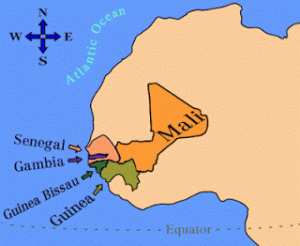As a West African, originally from Gambia, I am relieved that the glare of publicity about Ebola in New York City is waning along with the spread of the disease.
At the height of the Ebola crisis in the city, just around the time in October when Dr. Craig Spencer fell ill, I and other West Africans I knew here were scared of being tarred with the broad brush of Ebola, as if the deadly disease were endemic to the region and to us, even though its first flare up was in Central Africa in the 1970s.
Everywhere in the city, Ebola was a topic of discussion: in barbershops, in schools, in West African shops on 116th Street in Harlem. The barrage of Ebola news was inundating, inescapable for a West African like me.
One day I took a cab from 116th Street in Harlem heading home to Washington Heights. The cab driver, upon realizing my accent, asked about my nationality. I am a naturalized American but I replied, “Gambia.” He asked, “Where is that?” I responded: “West Africa.” Suddenly, and just as I had expected, an eerie silence fell upon us. A few minutes later, the driver, perhaps unsure of what to make of me, asked more questions: “So is your country safe from Ebola?” “How far is your country from Guinea?” “When was the last time you went home?”
I have not visited Gambia for years now, certainly not during the recent Ebola crisis in West Africa. But I reckoned that the driver was simply trying to be sure I had not come from any of the affected countries in the sub-region or gotten anywhere close to them. He was in danger-control mode. I wondered to myself that evening after he dropped me off if he had been comforted enough by what I had told him. Or if he was going to do his own “Ebola cleanup” inside his cab. I wasn’t sure.
On October 30, the famous singer Angelique Kidjo from Benin, West Africa, penned an op-ed in the New York Times recounting a similar encounter she had with a New York cab driver: “When I jumped into a taxi in New York recently,” she writes, “the driver asked me where I came from. When I said “I am West African,” he muttered one word: Ebola.”
The stigma of Ebola, like most stigmas, is fueled by ignorance, the reflexive inclination to lump all groups, and in this case, all countries, together. Yes, Ebola is in West Africa, but it is mainly in three countries: Guinea, Sierra Leone and Liberia. Yes, it is in those countries, but it is in certain areas, not the entire swathes of land, in each of those countries. Even though health agencies clearly labeled the affected countries on the African map, to help in the geographical understanding of the disease, some people still persisted in painting the entire West African region or the continent as a whole with the same image of Ebola.
It is hard to fight and overcome stigma, especially when it is ubiquitous and propelled into the public consciousness by a plethora of social media bent on providing information without context. In my interactions with some people in New York City, I have had to simply bat away their allusive comments about my West African-ness in connection with the spread of Ebola. I used to be upset. But I no longer am. Maybe because people have stopped asking me about Ebola.

